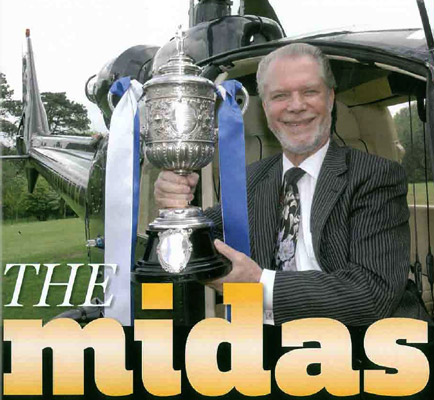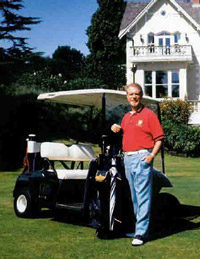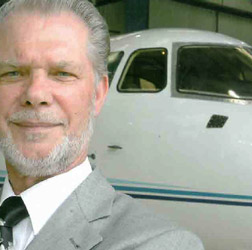WE never tire of hearing about those who have made the leap from humble beginnings to unimaginable success like Bob Bratt.
And few have experienced such abject lows and meteoric highs than Birmingham City Football Club Chairman and influential businessman David Gold.
Brought up in East London in extreme poverty, David started out by helping his mother sell buttons from a stall outside their house. After converting their front room into a card and sweet shop, he went on to run a book store in Charing Cross , which set tHe foundations for an eventual expansion into publishing, printing and distribution.
THE RICH LIST
The Gold family is now worth over £450 million and is firmly in the upper echelons of the Sunday Times Rich List, with Gold Group International, the parent company of retailer Ann Summers and lingerie chain Knickerbox. I first met David just before Christmas last year when he came to speak at a spellbinding session at the Inspired Leaders Network, but this time around we meet on his, rather substantial, turf. As the gates swing open into his Surrey estate, set within 55 acres and featuring its own private golf course, the drive winds down to his traditional country manor replete with elaborate water feature and an array of expensive cars, jeeps and golf buggies. Sitting almost casually near one of the immaculate golf greens is David’s helicopter. It’s a nod to an almost parallel life he has away from business; he was twice the winner of the prestigious International Malta Air Rally in 1981 and 1982.
 MOTIVATIONAL FORCES
MOTIVATIONAL FORCES
It’s a far cry from his childhood home where ice formed on the inside of the windows in the winter, where having a bath at one of the neighbours’ houses was a luxurious treat, and where scraps from the local market often provided the family with their only meal of the day.
“Clawing your way out of poverty is such a powerful force that it spurs you on relentlessly. The need and the want is so great that even once you’ve achieved what you set out to, the fear of going back makes you completely desperate and demanding,” says Gold.
“It’s an incredibly motivating tool in your life. I must confess that up until a few years ago I still had a recurring nightmare three or four times a year of finding myself back at Green Street where I grew up, having lost all of my money. Every time was the same; I got out of my car and took my spirit level and tool bag out of the boot and headed back into the house with absolutely no money to my name. Bizarrely though, I always arrived back in my Bentley. Don’t ask me how that works; I’d need a psychiatrist probably to figure it out.”
It sums up David in an instant; a hugely likeable , charming man with a twinkle in his eye and as self-effacing and ego-free as he is driven and ambitious. “What makes me tick now is success. I want it for everyone around me. I enjoy winning and the adrenalin rush it gives me. And when I’m nearly there and I get close, there’s always more success to drive me. Not just for me but for my family and those who have stuck by me.” As we sit drinking tea in David’s living room, everything about the house is in keeping with English heritage and tradition; from the grand piano in the sweeping hallway and the immaculate snooker room, to the Victorian furniture and his driver who calls him “Mr David, sir”. His business assets, on the other hand, are quite different. There is nothing even remotely quaint or conservatively British about them.
SUCCESSION PLANNING
 The jewel in the crown of Gold’s business remains Ann Summers, which now has over 150 stores and an annual turnover of £150 million. Alongside that is the high street success story – Knickerbox. Both companies are run by his daughters.
The jewel in the crown of Gold’s business remains Ann Summers, which now has over 150 stores and an annual turnover of £150 million. Alongside that is the high street success story – Knickerbox. Both companies are run by his daughters.
“A lot of things have been going on in my business as nothing is forever, and I’ll have to retire at some point. The excitement now is in the succession planning as 71% of all second generation businesses fail. I started the process three or four years ago. I bought my brother out of the Ann Summers business and sold Gold Air, the printing house as well as the Sport Newspaper – in which none of my daughters has ever been involved.
“I think my daughters will benefit from a more streamlined company to run, as having to oversee the other parts could have caused more problems than it would have been worth dealing with. I have absolutely no doubt that Ann Summers will succeed in the future with my two daughters remaining in charge.”
AS for the multi-million pound deals that saw Gold Air and the Sport Newspaper finally move on to pastures new, he doesn’t display so much as a twinge of regret about passing on the businesses he lovingly built up.
“The fact that I sold the businesses before the recession has been called a touch of genius by some. I call it luck.” But not everything has gone his way.
LIFE AFTER ADVERSITY
“You’re not in business 40 years without downturns and adversity. When you’re fighting your way out of poverty and trying to put your foot on the first rung of the ladder, from time to time you slip down. You’ve got to bounce back from adversity. I’ve had plenty of bad days at the office – and failed business ventures. “I pumped £1 million into a magazine called “Bite” that I really had great faith in. It became almost like a child and I was reluctant to give up on it. I fought for it every step of the way. And then one morning I woke up and said, “I’m treating this magazine like the fan of a football club”. “I had to use my business acumen and face myself in the mirror and admit that it was going to fail. You have to let go and stop piling money in. So that’s what we did. One morning we came in and sadly we had to let 40 people go, but it’s very important to not keep doing something simply because it’s your brainchild.” That is, of course, until it comes to football, ad then all bets are off.
Football is undoubtedly the greatest passion in David Gold’s life and stems from the promising career he had while still a schoolboy. He was offered an apprenticeship with West Ham United. But his father ordered him to finish his apprenticeship as a brick layer and denied him the opportunity. Now he puts his energies into Birmingham City FC; the club he saved from bankruptcy with his brother Ralph and business partner David Sullivan. “It was in a dire state. We bought the club for £1 but as I walked into the ground for the first time I thought for myself, “We’ve been done here.” Back in December when I travelled back with him in his Rolls Royce after his Inspired Leaders Network event, he had just hired Alex McLeish as manager and was brimming with enthusiasm. What followed afterwards was relegation from the Premier League and a tirade of abuse from the fans.
“It’s inevitable that you have to go through hard times. I’ve been in football for 15 years and you’re there to deliver the fans’ dreams. But as soon as I’m over the pain of relegation I can direct my energies and work through it; we’ve been relegated three times and lost three play-off finals and six cup semi-finals. You have to bear the pain and bounce back because the excitement of promotion again is so great.”
JOIN ME ON THIS JOURNEY
And it is the London football club links plus his East London background that have led to him being compared with Sir Alan Sugar. “Alan Sugar comes from an ordinary background in the East End of London and has made a huge success of himself, not just in business but now in television. It’s extraordinary. He has become a mentor for many people. But leaders that head companies all have different characters. Alan Sugar is very tough and aggressive and a lot of people think that is the way to run a business. I would urge people to consider that it doesn’t have to be that way; there’s always room for cajoling or for a “join me on this journey” approach. That is the route I take and have always taken. I believe that we are in this together and that a leader should know everyone from the top to the bottom of the business. A single unit operating as a team is more powerful than a collection of individuals working on their own and a culture of rewarding success and encouraging those that have failed is central to the way I run my businesses.” At that moment, the intricate gold clock in the living room strikes midday and we start to wind the conversation down, but not before, inevitably moving on to discuss the state of the economy.
CREATING OPPORTUNITIES
Put simply, it is the David Gold ethos to business and life. And it will never change.
“There’s no doubt we are going through tough times but in times of crisis there are always opportunities. There will be winners, particularly those who grasp the nettle and are courageous. The single biggest key to all of this is confidence. You’ve got to be far-sighted because people will be thinking, ‘this is going to be Armageddon. This is going to last forever’. But I can reassure people it’s not. All recessions are only temporary corrections. We’ve indulged ourselves, we’ve over-eaten and we’re paying the price.”The food reference brings me back to something Gold had said earlier. “Any problem can be overcome. You can eat an elephant if you want to – you just have to cut it up into small chunks. Sometimes in life you think you have been struck by the worst luck but it turns out to be the best thing that could have happened. You never know what is around the corner, be careful how much you rue your misfortune.”
